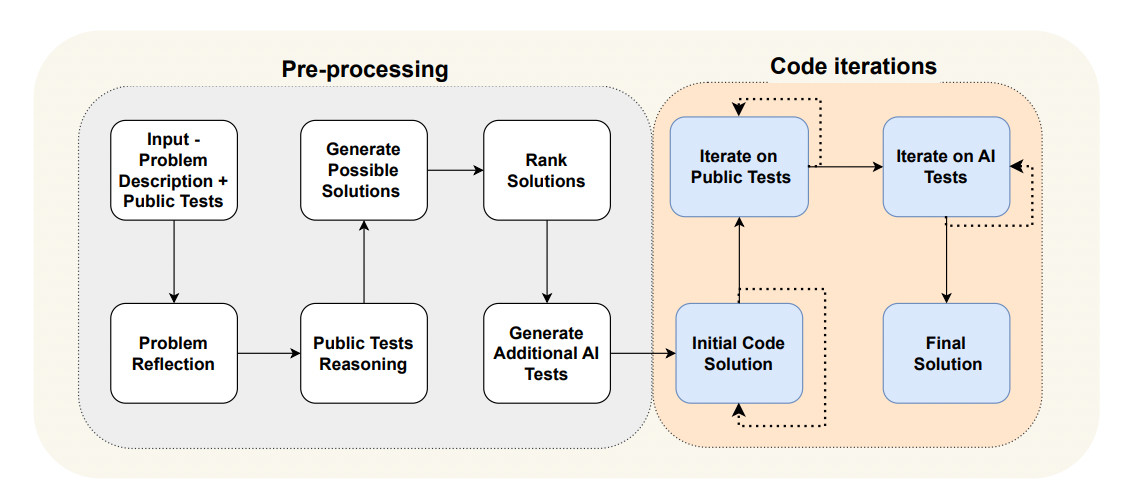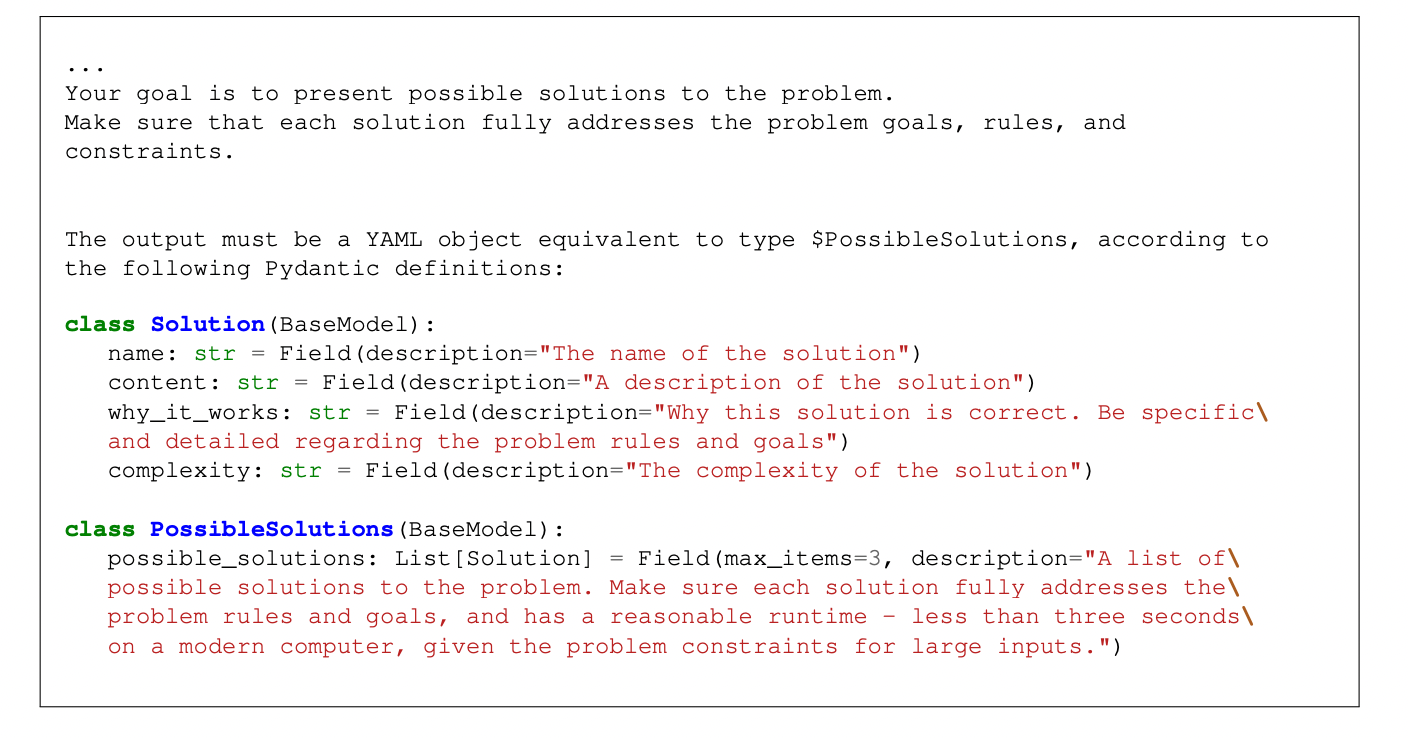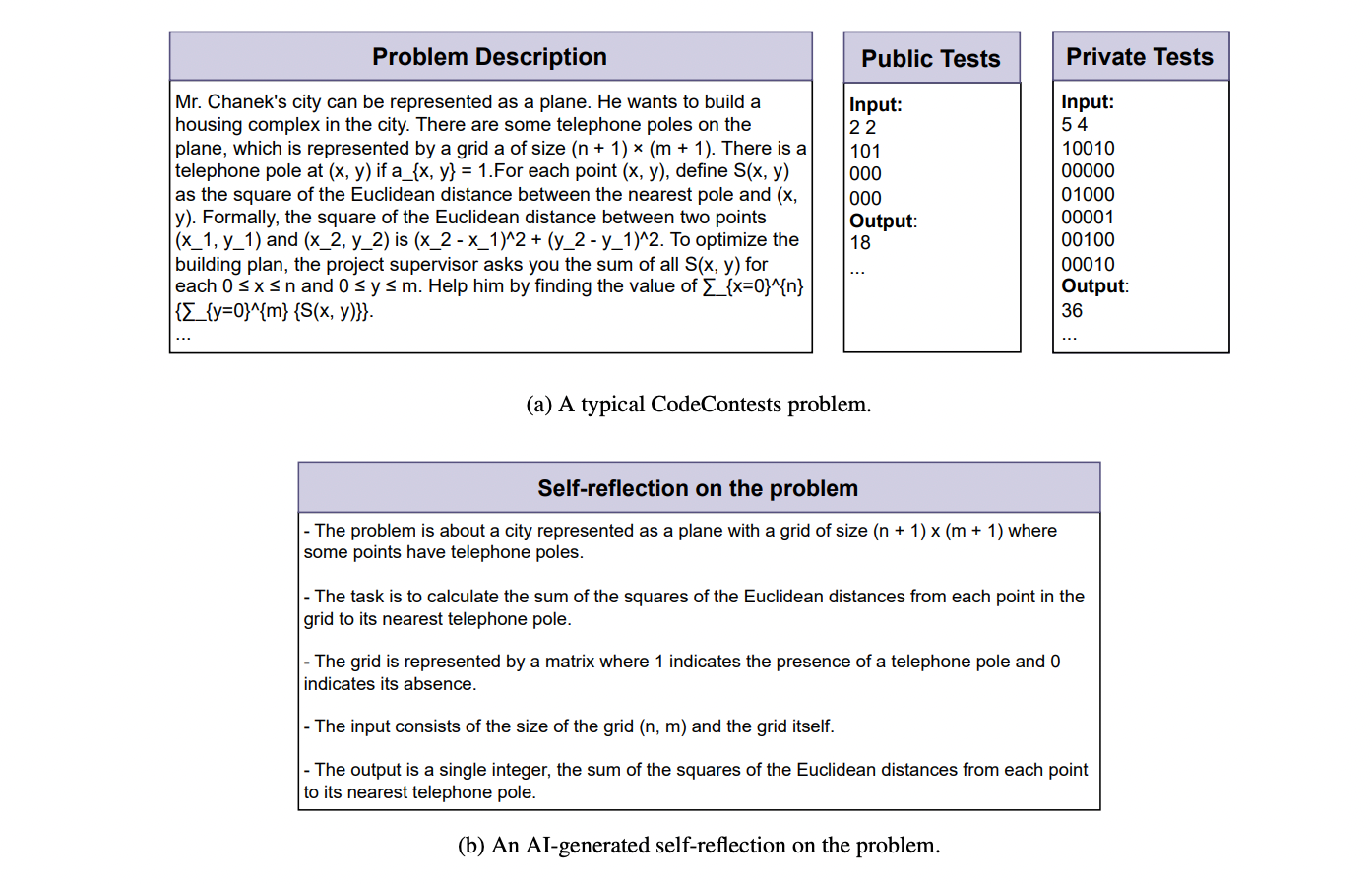 Technology peripherals
Technology peripherals
 AI
AI
 Traffic Engineering doubles code generation accuracy: from 19% to 44%
Traffic Engineering doubles code generation accuracy: from 19% to 44%
Traffic Engineering doubles code generation accuracy: from 19% to 44%
The authors of a new paper propose a way to "enhance" code generation.

#Code generation is an increasingly important capability in artificial intelligence. It automatically generates computer code based on natural language descriptions by training machine learning models. This technology has broad application prospects and can transform software specifications into usable code, automate back-end development, and assist human programmers to improve work efficiency.
However, generating high-quality code is still challenging for AI systems, compared with language tasks such as translation or summarization. The code must accurately conform to the syntax of the target programming language, handle edge cases and unexpected inputs gracefully, and handle the many small details of the problem description accurately. Even small errors that may seem innocuous in other areas can completely disrupt a program's functionality, causing it to fail to compile or run.
Recently, researchers at CodiumAI proposed AlphaCodium, a new method that can significantly improve the code generation capabilities of large language models such as GPT-4. Their point is that merely fine-tuning the wording of prompts has inherent limitations in solving complex coding problems. Instead, they designed a multi-stage process focused on iteratively generating, running, and debugging code against test cases, allowing the model to learn from practice.
Limitations of Prompt Engineering
In natural language tasks, prompt engineering refers to carefully adjusting the wording and structure of prompts to Guide the model to produce the desired output. For example, adding the phrase "Write a concise summary:" before the input text can cause the model to generate a more accurate summary.
Prompt engineering has proven to be very effective in doing text generation to guide the behavior of large language models. However, when it comes to coding problems, researchers have found that even with extensive timely adjustments, only small gains can be achieved. This discovery is thought-provoking. Therefore, generating high-quality code still requires other solutions:
- # Exactly match the syntax of the target programming language
- Handle it elegantly Corner Cases and Unexpected Input
- Address all the little details and requirements described in the problem statement
- Ensure the code compiles correctly for all valid input and Run
These structural requirements are beyond the scope of text generation and cannot be hardcoded into the prompt. The prompts themselves lacked the coding skills and concrete feedback needed for model learning.
AlphaCodium Iterative Process
To address these challenges, researchers developed an iterative process specifically tailored to the structure of the code generation problem. The key innovation is to use the execution results of the generated code as learning signals to provide direct feedback.
AlphaCodium’s process has two main stages:
Preprocessing
- The model interprets the problem description as Bullet points to extract key details.
- Explain the intended logic behind each example input/output.
- Provide two or three natural language solutions.
- Generate additional different test cases for code coverage.
Code Iteration
- The model generates initial code solutions.
- Repeat this code against the public test case to fix any errors that occur.
- Do the same thing for the test cases generated by the model.
- Additional test cases are added to the growing suite of "test anchors" to prevent regressions.
By incrementally reasoning about the problem, developing solution hypotheses, extending test coverage, and iteratively generating and debugging code, the model learns through experience - which is high-quality code Generate the required skills.

Figure 1. Prompt example with structured output (generate possible solution phase)
Researchers found that designing processes into modules with clear interfaces and goals leads to better results compared to an end-to-end model. Each phase first focuses on simpler subtasks to build knowledge and uncover insights that inform downstream phases. Upstream stages like test generation do not require a complete solution, only basic reasoning.
Experimental Results
The researchers evaluated AlphaCodium against the CodeContests benchmark, which contains hundreds of participants from competitive programming competitions. A coding issue.

Figure 2. Problem description and reflection - an example of a typical CodeContests question, self-reflection on the problem based on artificial intelligence. While the initial description is long and complex, proper self-reflection can make the problem clearer and more coherent, leading to improved code solutions Compared with a single hint, AlphaCodium improved the code generation accuracy on the validation set from 19% to 44%. This benefit holds true across different model sizes and test sets, and is significantly more effective than a separate hint project.
AlphaCodium also performs significantly better than previously published methods, such as AlphaCode and CodeChain, while using fewer computing resources. For example, by avoiding unnecessary brute force generation, its accuracy is comparable to AlphaCode while requiring 10,000 times fewer model queries.
These results demonstrate the value of designing an AI system holistically around a task structure, rather than treating it as a general-purpose text generator. By incorporating iterative code running and debugging, AlphaCodium better aligns the training process with the ultimate goal of producing robust, practical code.
Broader Impact
While demonstrated against a competitive programming problem, the concepts used in AlphaCodium provide insights into AI advancing code generation A wider range of applicable experience:
The prompt project alone has limitations for handling complex code tasks. Concrete problem-solving experience is critical.
- Test-based development specifications can provide a basis for model training. The test provides an explicit fitness function.
- Iterative code debugging focuses model improvement on the errors that actually occur.
- Test coverage extensions highlight generalization gaps not visible in hints.
- Soft decision-making with double verification reduces vulnerability and bias.
- #AlphaCodium provides a promising new paradigm for code generation based on software engineering best practices. There remain open research questions regarding generalizability and computational overhead. But the principles presented here (learning from experience, test-driven development, modular reasoning, and iterative debugging) seem to provide a solid foundation for improving coding capabilities for AI.
Paper link: https://arxiv.org/pdf/2401.08500.pdf.
Code base: https://github.com/Codium-ai/AlphaCodium.
Original title: "Flow engineering" doubles code generation accuracy (19% vs 44%), author: Mike Young
Link: https:// notes.aimodels.fyi/flow-engineering-intensifies-for-code-generation/.
The above is the detailed content of Traffic Engineering doubles code generation accuracy: from 19% to 44%. For more information, please follow other related articles on the PHP Chinese website!

Hot AI Tools

Undresser.AI Undress
AI-powered app for creating realistic nude photos

AI Clothes Remover
Online AI tool for removing clothes from photos.

Undress AI Tool
Undress images for free

Clothoff.io
AI clothes remover

AI Hentai Generator
Generate AI Hentai for free.

Hot Article

Hot Tools

Notepad++7.3.1
Easy-to-use and free code editor

SublimeText3 Chinese version
Chinese version, very easy to use

Zend Studio 13.0.1
Powerful PHP integrated development environment

Dreamweaver CS6
Visual web development tools

SublimeText3 Mac version
God-level code editing software (SublimeText3)

Hot Topics
 1378
1378
 52
52
 Bytedance Cutting launches SVIP super membership: 499 yuan for continuous annual subscription, providing a variety of AI functions
Jun 28, 2024 am 03:51 AM
Bytedance Cutting launches SVIP super membership: 499 yuan for continuous annual subscription, providing a variety of AI functions
Jun 28, 2024 am 03:51 AM
This site reported on June 27 that Jianying is a video editing software developed by FaceMeng Technology, a subsidiary of ByteDance. It relies on the Douyin platform and basically produces short video content for users of the platform. It is compatible with iOS, Android, and Windows. , MacOS and other operating systems. Jianying officially announced the upgrade of its membership system and launched a new SVIP, which includes a variety of AI black technologies, such as intelligent translation, intelligent highlighting, intelligent packaging, digital human synthesis, etc. In terms of price, the monthly fee for clipping SVIP is 79 yuan, the annual fee is 599 yuan (note on this site: equivalent to 49.9 yuan per month), the continuous monthly subscription is 59 yuan per month, and the continuous annual subscription is 499 yuan per year (equivalent to 41.6 yuan per month) . In addition, the cut official also stated that in order to improve the user experience, those who have subscribed to the original VIP
 Context-augmented AI coding assistant using Rag and Sem-Rag
Jun 10, 2024 am 11:08 AM
Context-augmented AI coding assistant using Rag and Sem-Rag
Jun 10, 2024 am 11:08 AM
Improve developer productivity, efficiency, and accuracy by incorporating retrieval-enhanced generation and semantic memory into AI coding assistants. Translated from EnhancingAICodingAssistantswithContextUsingRAGandSEM-RAG, author JanakiramMSV. While basic AI programming assistants are naturally helpful, they often fail to provide the most relevant and correct code suggestions because they rely on a general understanding of the software language and the most common patterns of writing software. The code generated by these coding assistants is suitable for solving the problems they are responsible for solving, but often does not conform to the coding standards, conventions and styles of the individual teams. This often results in suggestions that need to be modified or refined in order for the code to be accepted into the application
 Can fine-tuning really allow LLM to learn new things: introducing new knowledge may make the model produce more hallucinations
Jun 11, 2024 pm 03:57 PM
Can fine-tuning really allow LLM to learn new things: introducing new knowledge may make the model produce more hallucinations
Jun 11, 2024 pm 03:57 PM
Large Language Models (LLMs) are trained on huge text databases, where they acquire large amounts of real-world knowledge. This knowledge is embedded into their parameters and can then be used when needed. The knowledge of these models is "reified" at the end of training. At the end of pre-training, the model actually stops learning. Align or fine-tune the model to learn how to leverage this knowledge and respond more naturally to user questions. But sometimes model knowledge is not enough, and although the model can access external content through RAG, it is considered beneficial to adapt the model to new domains through fine-tuning. This fine-tuning is performed using input from human annotators or other LLM creations, where the model encounters additional real-world knowledge and integrates it
 Seven Cool GenAI & LLM Technical Interview Questions
Jun 07, 2024 am 10:06 AM
Seven Cool GenAI & LLM Technical Interview Questions
Jun 07, 2024 am 10:06 AM
To learn more about AIGC, please visit: 51CTOAI.x Community https://www.51cto.com/aigc/Translator|Jingyan Reviewer|Chonglou is different from the traditional question bank that can be seen everywhere on the Internet. These questions It requires thinking outside the box. Large Language Models (LLMs) are increasingly important in the fields of data science, generative artificial intelligence (GenAI), and artificial intelligence. These complex algorithms enhance human skills and drive efficiency and innovation in many industries, becoming the key for companies to remain competitive. LLM has a wide range of applications. It can be used in fields such as natural language processing, text generation, speech recognition and recommendation systems. By learning from large amounts of data, LLM is able to generate text
 To provide a new scientific and complex question answering benchmark and evaluation system for large models, UNSW, Argonne, University of Chicago and other institutions jointly launched the SciQAG framework
Jul 25, 2024 am 06:42 AM
To provide a new scientific and complex question answering benchmark and evaluation system for large models, UNSW, Argonne, University of Chicago and other institutions jointly launched the SciQAG framework
Jul 25, 2024 am 06:42 AM
Editor |ScienceAI Question Answering (QA) data set plays a vital role in promoting natural language processing (NLP) research. High-quality QA data sets can not only be used to fine-tune models, but also effectively evaluate the capabilities of large language models (LLM), especially the ability to understand and reason about scientific knowledge. Although there are currently many scientific QA data sets covering medicine, chemistry, biology and other fields, these data sets still have some shortcomings. First, the data form is relatively simple, most of which are multiple-choice questions. They are easy to evaluate, but limit the model's answer selection range and cannot fully test the model's ability to answer scientific questions. In contrast, open-ended Q&A
 Five schools of machine learning you don't know about
Jun 05, 2024 pm 08:51 PM
Five schools of machine learning you don't know about
Jun 05, 2024 pm 08:51 PM
Machine learning is an important branch of artificial intelligence that gives computers the ability to learn from data and improve their capabilities without being explicitly programmed. Machine learning has a wide range of applications in various fields, from image recognition and natural language processing to recommendation systems and fraud detection, and it is changing the way we live. There are many different methods and theories in the field of machine learning, among which the five most influential methods are called the "Five Schools of Machine Learning". The five major schools are the symbolic school, the connectionist school, the evolutionary school, the Bayesian school and the analogy school. 1. Symbolism, also known as symbolism, emphasizes the use of symbols for logical reasoning and expression of knowledge. This school of thought believes that learning is a process of reverse deduction, through existing
 SOTA performance, Xiamen multi-modal protein-ligand affinity prediction AI method, combines molecular surface information for the first time
Jul 17, 2024 pm 06:37 PM
SOTA performance, Xiamen multi-modal protein-ligand affinity prediction AI method, combines molecular surface information for the first time
Jul 17, 2024 pm 06:37 PM
Editor | KX In the field of drug research and development, accurately and effectively predicting the binding affinity of proteins and ligands is crucial for drug screening and optimization. However, current studies do not take into account the important role of molecular surface information in protein-ligand interactions. Based on this, researchers from Xiamen University proposed a novel multi-modal feature extraction (MFE) framework, which for the first time combines information on protein surface, 3D structure and sequence, and uses a cross-attention mechanism to compare different modalities. feature alignment. Experimental results demonstrate that this method achieves state-of-the-art performance in predicting protein-ligand binding affinities. Furthermore, ablation studies demonstrate the effectiveness and necessity of protein surface information and multimodal feature alignment within this framework. Related research begins with "S
 SK Hynix will display new AI-related products on August 6: 12-layer HBM3E, 321-high NAND, etc.
Aug 01, 2024 pm 09:40 PM
SK Hynix will display new AI-related products on August 6: 12-layer HBM3E, 321-high NAND, etc.
Aug 01, 2024 pm 09:40 PM
According to news from this site on August 1, SK Hynix released a blog post today (August 1), announcing that it will attend the Global Semiconductor Memory Summit FMS2024 to be held in Santa Clara, California, USA from August 6 to 8, showcasing many new technologies. generation product. Introduction to the Future Memory and Storage Summit (FutureMemoryandStorage), formerly the Flash Memory Summit (FlashMemorySummit) mainly for NAND suppliers, in the context of increasing attention to artificial intelligence technology, this year was renamed the Future Memory and Storage Summit (FutureMemoryandStorage) to invite DRAM and storage vendors and many more players. New product SK hynix launched last year



